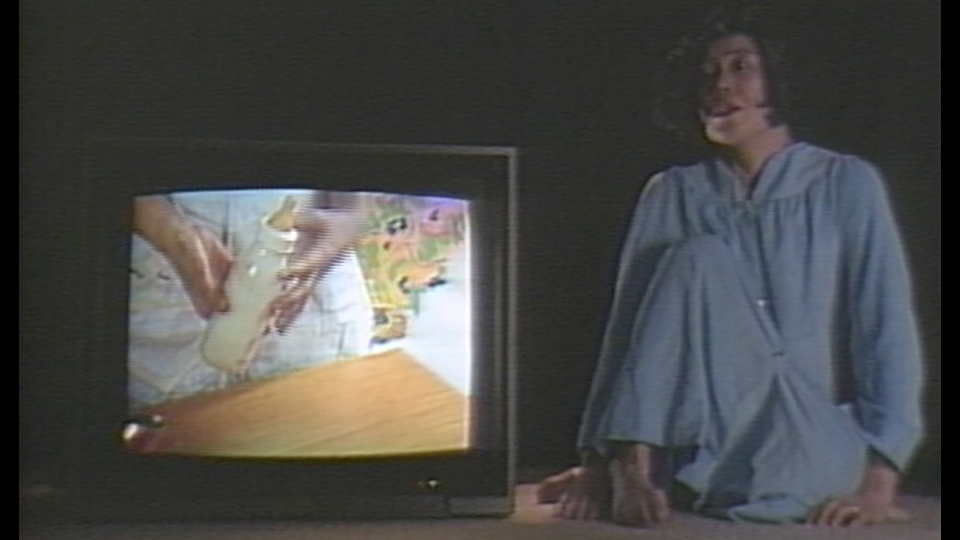Prefiguring Immediacy: Video Art by Mako Idemitsu
Logan Center for the Arts, 916 E. 60th St.
Sunday, April 3, 2022 at 7pm
Q&A with University of Chicago Department of Art History master’s student Toby Wu and University of Southern California School of Cinematic Arts PhD candidate Wakae Nakane.

Mako Idemitsu is a pioneering media artist, beginning her practice in 1960s California, and advancing the definitions of television art in 1970s Japan. Working with key figures in the west coast feminist art movement and the burgeoning Tokyo video scene, Idemitsu developed a visual lexicon of intertextual, mise en abyme frames known as Mako-style. Attuning her viewers away from the infrastructural and towards the domestic, Idemitsu activates the household television set within melodrama household scenes, using this ubiquitous yet unassuming frame to expose the repressed subconsciousnesses of Japanese women. Surrealistic yet burdened with the patriarchal expectation, the subtle resistance of Idemitsu’s televisual frames are horrifyingly spell binding. Weaving decades of oppression and comportment into a singular time-space, we feel the protagonists’ desire in every frame. This program features Idemitsu’s seminal experimental film and televisual video works, charting her exploration of feminist thought and the immediacy of television. Starting with Inner-Man (1973, 4 min.), Idemitsu’s work contemplates dualistic gendered experience, juxtaposing the poised femininity of a traditional Japanese female dancer and a free-spirited, nude, Caucasian improvisational dancer. In three key Mako-style works, Another Day of a Housewife (1977, 10 min.), Hideo, It’s Me, Mama (1983, 27 min.), and Kiyoko’s Situation (1989, 25 min.), Idemitsu explores the distinct struggles of Japanese housewives at different stages of their lives. Films courtesy of Studio Idemitsu.
Toby Wu (he/him/his) is a Master’s candidate at the University of Chicago reading Art History and Media Studies. He is interested in the emergence of time based media practices in the Global Contemporary, specifically through Transpacific exchanges between Japan, Southeast Asia, and the United States of America. Toby is the Graduate Curatorial Intern for Transpacific Art Histories at The Smart Museum and was an inaugural (2021) Asia Art Archive in America & PoNJA GenKon fellow. He has previously worked with KADIST Art Foundation (San Francisco), National Gallery Singapore, and Museum of Contemporary Art and Design (Manila).
Wakae Nakane received her BA in Art History and MA in Cinema Studies from Nagoya University, Japan. She joined the Division of Cinema and Media Studies at the USC School of Cinematic Arts as a PhD student in 2019. Her research focuses on Japanese feminist documentary, developing questions around feminist historiography and promoting previously marginalized woman filmmakers. She has been an active participant in Japan’s independent film scene, working at the Yamagata International Documentary Film Festival and a local art theater in her hometown of Nagoya. Her publications include “Constructing an Intimate Sphere Through Her Own Female Body: Naomi Kawase’s Documentary Films” in Female Authorship and the Documentary Image (eds. Boel Ulfsdotter and Anna Backman Rogers, 2018) and Eizogaku (in Japanese), and “Female Performers as Authors: Documentary Film Extreme Private Eros: Love Song 1974 and the Women’s Liberation Movement” in JunCture (in Japanese).
Presented by South Side Projections, the Reva and David Logan Center for the Arts, the University of Chicago Center for the Study of Gender and Sexuality, and the Center for East Asian Studies at the University of Chicago with generous support from a Title VI National Resource Center Grant from the U.S. Department of Education.
